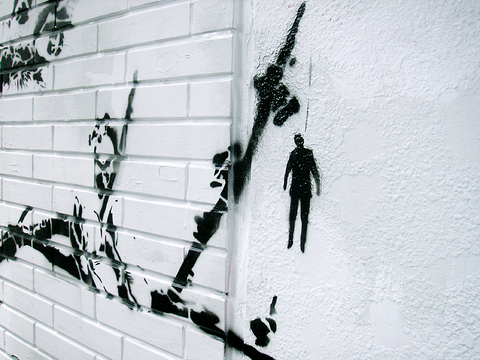Ever since Chang Shuo-yin (張碩尹), 23, was a student at the Department of Advertising at National Chengchi University (政治大學), he was taken with spraying graffiti on the walls of his campus. He also led a group called the Mountain Guerillas (上山打游擊), who converted an empty building -- refered to as "The Ruin" by local graffiti artists and connoisseurs -- into a repository of graffiti art.
Under the tag Bbrother, taken from George Orwell's novel Big Brother, Chang continues to work as a graffiti artist with a clear political bent. His vivid mural of a farmer pointing a gun to his own head, with the slogan "cheap rice hurts farmers" (穀賤傷農), is a protest against Taiwan's WTO membership. The image of a baby with its penis tied in a knot is a provocative critique of Taiwan's laws on assemblies, processions and demonstrations (集會遊行示威法). His graffiti can be seen in various parts of Taipei, including the alleys behind Eslite Book Stores (誠品台大店) near National Taiwan University (NTU), and The Ruin, which he and others wrested from police as a de facto base for their graffiti art. In spite of disagreements with local authorities regarding whether the artists could spray in The Ruin, the police have largely let them convert the abandoned building into their unofficial studio.
Lee Ming-tsung (李明璁), assistant professor in sociology at NTU, suggests that graffiti in Taiwan serves as a safety valve venting social anger, preventing young artists' pent up aggression from being expressed through violence.

PHOTO: GINGER YANG, TAIPEI TIMES
Bbrother's take on this form of street art is that it simply satisfies "the primitive desire to paint on something solid, just like ancient people painted their caves."
Few graffiti artists take their work as seriously as Bbrother, but such committed urban artists, even in limited numbers, are spearheading a genre all their own, fusing pop-art graphics with elements of traditional Chinese painting. Interestingly, while some condemn graffiti art as vandalism, others view it as a catalyst for social reform. "Graffiti cannot provide details of an issue, but it can draw attention, [provoking dialogue]," Lee said.
Big businesses have tried to appropriate the cachet of graffiti for their marketing strategies and products. Even Bbrother does occasional commercial work, but is discreet about it, perhaps aware that the anti-capitalist messages often contained in graffiti could be easily corrupted by such commercialization. Bbrother insists that he wants to keep graffiti distinct from other art genres.
Taipei has long been portrayed as a multicultural city in which the freedom of expression thrives. "I have rarely met a policeman or angry resident while painting on a wall. The police won't interrupt you if you act like a young man who loves art," Chang says. Such a statement suggests that the city indeed possesses a high threshold for expression, and that Taipei residents are very tolerant of graffiti as an artform and its proponents.

Taiwan has next to no political engagement in Myanmar, either with the ruling military junta nor the dozens of armed groups who’ve in the last five years taken over around two-thirds of the nation’s territory in a sprawling, patchwork civil war. But early last month, the leader of one relatively minor Burmese revolutionary faction, General Nerdah Bomya, who is also an alleged war criminal, made a low key visit to Taipei, where he met with a member of President William Lai’s (賴清德) staff, a retired Taiwanese military official and several academics. “I feel like Taiwan is a good example of

March 2 to March 8 Gunfire rang out along the shore of the frontline island of Lieyu (烈嶼) on a foggy afternoon on March 7, 1987. By the time it was over, about 20 unarmed Vietnamese refugees — men, women, elderly and children — were dead. They were hastily buried, followed by decades of silence. Months later, opposition politicians and journalists tried to uncover what had happened, but conflicting accounts only deepened the confusion. One version suggested that government troops had mistakenly killed their own operatives attempting to return home from Vietnam. The military maintained that the

Before the last section of the round-the-island railway was electrified, one old blue train still chugged back and forth between Pingtung County’s Fangliao (枋寮) and Taitung (台東) stations once a day. It was so slow, was so hot (it had no air conditioning) and covered such a short distance, that the low fare still failed to attract many riders. This relic of the past was finally retired when the South Link Line was fully electrified on Dec. 23, 2020. A wave of nostalgia surrounded the termination of the Ordinary Train service, as these train carriages had been in use for decades

Lori Sepich smoked for years and sometimes skipped taking her blood pressure medicine. But she never thought she’d have a heart attack. The possibility “just wasn’t registering with me,” said the 64-year-old from Memphis, Tennessee, who suffered two of them 13 years apart. She’s far from alone. More than 60 million women in the US live with cardiovascular disease, which includes heart disease as well as stroke, heart failure and atrial fibrillation. And despite the myth that heart attacks mostly strike men, women are vulnerable too. Overall in the US, 1 in 5 women dies of cardiovascular disease each year, 37,000 of them